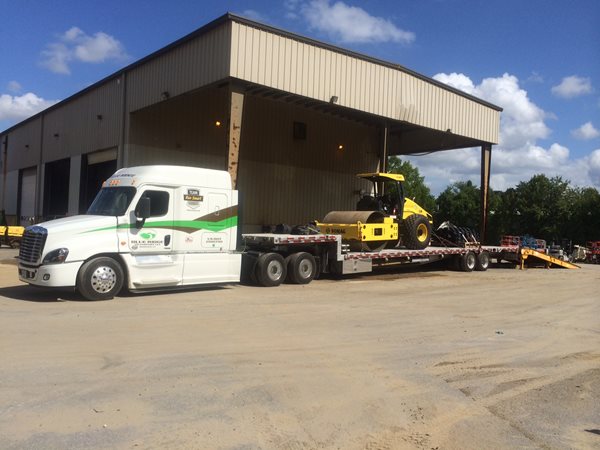Most of my loads with my step deck trailer only require straps to secure the freight. The 4″ straps on my trailer have a working load limit (WLL) strength of 5400# and are lightweight and easy to use. The 3/8″ transport grade 70 chains that I use have a WLL of 6600#, so they’re a little stronger than the straps. However, some freight doesn’t allow for straps and are made for chains. Heavy equipment for example, has built in chain securement points so that’s the correct way to secure that type of freight.

On a recent trip, I was able to use my chains to secure a compactor, or more commonly known as a steamroller on a short load from Baltimore, MD to Roanoke, VA. The compactor weighed 25,000# so I needed enough chains to secure half of that weight. I used 3 chains which gave me a WLL of 19,800, more than the 12,500 that I needed. I used the indirect tie down method which goes from an anchor point on the trailer, through, over, or around the cargo and then attaches to another anchor point on the trailer. Using this method, I get the full 6600# strength of the chain. If I use the direct method: The tie down goes from an anchor point on the trailer to an attachment point on an article of cargo, I would only get 3300# WLL or half the strength of the chain. That method would require me to use more chains. The direct method is used with tracked vehicles quite often. Even though it requires more chains, this method reduces the likelihood of the equipment shifting or sliding on the trailer.

I'm not an expert on this, but I know experts and they told me to buy ratchet chain binders instead of the lever or "snap" binders you see some people using. They have to place a "cheater bar" over the snap binder to get more leverage and "snap" it shut. That's called the "bear trap" but it's actually a reverse bear trap because all the force is on the binder when it's in the closed position. When the binder accidentally springs open with a few hundred pounds of force, drivers get hurt. I've seen flatbed drivers with broken jaws and missing teeth when they were too close to a snap binder that decided to snap!
Safety is the most important part of our jobs. I don't dare leave the shipper until I'm confident that all freight is secured adequately, safely and legally. If you're unsure of something, like I've been, go and track down a more experienced driver who's handled that type of freight securement before. I've never been turned down when I've asked for help from fellow drivers.